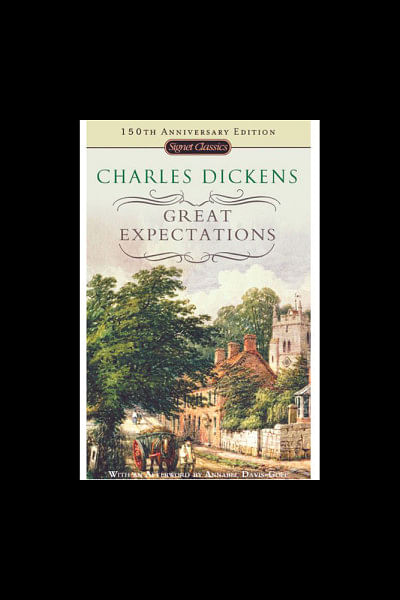Expectations to climb social ladder

REVIEWED BY NAZIA JAHAN
PUBLISHER: CHAPMAN & HALL IN ENGLAND, HARPER & BROTHERS IN USA
DATE OF FIRST PUBLICATION: 1861
GENRE: AUTOBIOGRAPHICAL FICTION, BILDUNGSROMAN.
Set in the mid-nineteenth century England, Great Expectations is one of Dickens' most famous works and is even considered his best book by most critics. As most of his novels are, Great Expectations can also not be categorized under one genre. It is simultaneously a mysterious tale with several climactic twists and a love story full of passion and drama, while being a narrative that serves the purpose of a serious social commentary with a tone of satirical humor. Even then, it is taken as of the bildungsroman genre since it portrays the growth of the protagonist's personality from his childhood to middle age.
Much like a fable, Great Expectations implies quite a simple moral: the things that matter and should be prioritized in life are not wealth, class and social advancement of one's status, but rather affection, loyalty, conscience and kindness. In three segments or volumes of the novel, Dickens shows the development of Pip's character from a kind and generous young boy to an arrogant and quite ungrateful "gentleman". Through Pip's character, Dickens brings out the socio-economic issues regarding class and status in the Victorian England.
As far as the synopsis goes, with little spoiler to give away, the story starts off as Pip as a young orphan living with his abusive sister and much kinder brother in law, Joe, who is the village blacksmith, in Kent. He stumbles upon Magwitch, an escaped convict, and helps to break him free of the leg irons, making Magwitch forever be indebted to him even though he gets imprisoned again. Pip is later introduced to the lavish upper class lifestyle when he is sent to entertain Miss Havisham by his pompous uncle, Uncle Pumblechoock. Miss Havisham is a bitter old, wheel chair bound lady who was abandoned by her fiancé on the wedding day. Perhaps it was her attempt to stop time that she is shown to be wearing her wedding gown even after all these years, along with the fact that all the clocks in her mansion are paused and that her now rotten wedding cake is still on the dining room table. Pip falls in love with her adopted daughter, Estella, who is beautiful and polished yet distant and cold. Estella makes Pip conscious of his commonness and he grows uneasy of his social status. He longs to be a "gentleman" and not a blacksmith. His dreams start to take form when an anonymous benefactor sends a lavish amount of allowance to him.
From that moment onwards, Pip's life along with his personality change drastically. He goes to London to learn to become a gentleman and forgets about his sister, Joe and his friend, Biddy. He grows more and more ashamed of his humble origins and thinks that any association with them would demean him before Estella. One of the many twists and turns of the story is when he finds out his benefactor is not Miss Havisham, as he had assumed from the beginning, but rather Magwitch, the convict he had once helped. Estella breaks his heart and gets married to his archenemy, Drummle. Pip then goes back home with the intention of making amends with Joe and marry Biddy, however he finds out that they have married one another already after his sister's death. He leaves for Cairo afterwards and lives there for eleven years. The novel ends when he comes back and meets Estella after many years. She is now a widow and they part ways as friends, though it is implied strongly that they may be together this time; as the last line says: "…I saw the shadow of no parting from her." Dickens never fails to put such beautifully dramatic imagery in words.
Personal feedback on this novel is going to be extremely partial, coming from a blind fan of Charles Dickens' works. Great Expectations is, hands down, one of the most complicated yet heart-warming and moving love stories that I have come across. There are a good number of moments that stand out, moments of comic reliefs, and moments of suspense or passion. I have read this book for more than once and each time I found it hard to resist myself from turning the pages to read on further; each time, it felt like a completely new experience
The reviewer studies English Literature at Independent University, Bangladesh

 For all latest news, follow The Daily Star's Google News channel.
For all latest news, follow The Daily Star's Google News channel. 



Comments